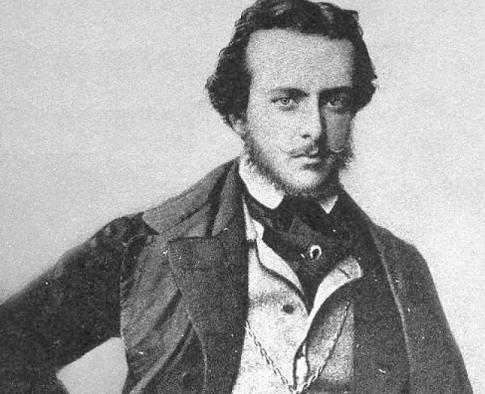Alfred de Musset (1810-1857)

Alfred de Musset was a French dramatist, poet, and novelist.
French Romantic poet and playwright, remembered for his poetry. A love affair with the novelist George Sand between the years 1833 and 1835 inspired some of Musset's finest lyrics. Much influenced by Shakespeare and Schiller, Alfred de Musset wrote the first modern dramas in the French language.
"How glorious it is, but how painful it is also, to be exceptional in this world!" (from La Merle Blanc, 1842)
Alfred de Musset was born in the middle of old Paris, in a house on the Rues des Noyers near the Hôtel de Cluny. Both of his parents were descended from distinguished families, and his father had written several historical and travel works. Musset entered the Collège Henry IV, where his schoolmater included the Duke or Orleans, and graduated with honors in 1827. After hesitating between many professions, Musset abandoned medicine because of his distaste of the dissecting room. Instead, he studied painting for six months in the Louvre.
Musset began his career as a poet and dramatist in 1828 with the publication of a ballad called 'A Dream'. His early poems won the approval of Victor Hugo, who accepted Musset in his Romantic literary circle Cénacle.
Musset's parodic collection of poems in LES CONTES D'ESPAGNE ET D'ITALIE (1830) showed the influence of Lord Byron. In 1830, at the invitation of the director of the Théâtre de l'Odeon, Musset wrote LA NUIT VÉNETIENNE, the first of his plays to be produced. After the humiliating failure on the stage, Musset refused to allow his other plays than historical tragedies and comedies to be performed. This decision partly liberated him from the thoughts of "technique"-he did not care whether the plays made an effect or no. At that time theatre, on the other hand, was for writers a good means to reach their audience. A theatre ticked was not so expensive than a book. Musset's relatively well-made books, which cost only 3.50 francs, still did not reach a public of petits-bourgeois, craftsmen, or workers, who earned little more than 4 francs per day.
In 1833 Musset met George Sand, with whom he started an intense relationship, which inspired the celebrated four 'Nuits' (1835-37). His autobiographical work, LA CONFESSION D'UN ENFANT DU SIÈCLE (1835), a fictionalized account of the affair written in the form of an apologia, was a succès de scandale. This work reflected the mal du siècle, the disillusioned moral atmosphere in the period of strife between liberals and monarchists. "Everything that was no longer exists; everything that is to be does not yet exists," Musset once said. In 1834 Musset visited Venice with Sand; their journey was a turning point in Musset's life. They both became dangerously ill, but Sand fell in love with her physician, and Musset returned to France alone and in despair.
The stormy year inspired his plays ON NE BADINE PAS AVEC L'AMOUR and LORENZACCIO, which is sometimes considered his finest drama; the 'Lettre a Lamartine' from this period is considered one of the most beautiful pages of French literature. Lorenzaccio, written in 1834 and produced in 1896, was based on the murder of the Florentine tyrant Alessandro de'Medici by his cousin Lorenzo, known as Lorenzaccio. Idealistic Lorenzo wins the confidence of Alessandro in order to assassinate the tyrant. In the process, he loses his believes that the rebellious faction led by the Strozzis is capable of declaring a republic. He proceeds with the original plan and Cosimo de'Medici is declared the new ruler of Florence. Defeated in his hopes for justice and freedom, Lorenzo is finally assassinated in turn.
Musset became engaged to Aimée d'Alton in 1837. The relationship faded within a year and was followed by brief affairs. Throughout his life, Musset also frequented prostitutes and used occasionally opium. His health began to fail and after 1840s Musset's literary production as a dramatist diminished. However, POÉSIES NOUVELLES (1836-52) included 'Les Nuits', the series of lyrics for which Musset is best-known.
Musset was appointed librarian of the Home Office by the Duke of Orleans. The pay was small, 3,000 francs, and it has been said that there was no library at all. In 1845 Musset was named a Chevalier of the Legion of Honor in 1845. From the late 1840s his plays, which were recognized for their profound grasp of the psychology of love, started to enjoy success on the French stage. Musset's later works include the patriotic song 'Le Rhin Allemand', and the popular comedy IL FAUT QU'UNE PORTE SOIT OUVERTE OU FERMÉE (1845). In 1852 Musset was elected to the French Academy. In the same year he entered into a love affair with Louise Colet, the former mistress of Gustave Flaubert.
For the last two years of his life, Musset was confined to his apartment near the Comédie-Française. His heart ailment, an unusual vascular malfunction that became known to scientist as the Musset symptom, was aggravated by drinking. He died in Paris on May 2, 1857. Nowadays Musset's popularity is considered second only to Racine and Moliere. "My glass is not big, but I drink out of my own glass," he once stated self-consciously. His influence is probably best seen in the plays of Jean Anouilh. Many of the titles for his works were taken from proverbs popular at the time.
Tristesse
J'ai perdu ma force et ma vie,
Et mes amis et ma gaîté;
J'ai perdu jusqu'à la fierté
Qui faisat croire à mon génie.
Quan j'ai connu la Vérité,
J'ai cru que c'était une amie;
quand je l'ai comprise et sentie,
J'en étais féjà dégoûté.
Et pourtant elle est éternelle,
Et ceux qui se sont passés d'elle
Ici-bas ont tout ignoré.
Dieu parle, il faut qu'on lui réponde.
Le seul bien qui me reste au monde
Est d'avoir quelquefois pleuré.




 del.icio.us
del.icio.us Digg
Digg

Post your comment